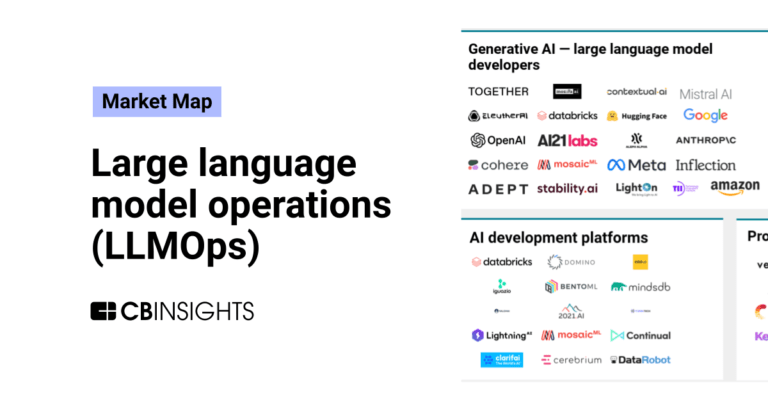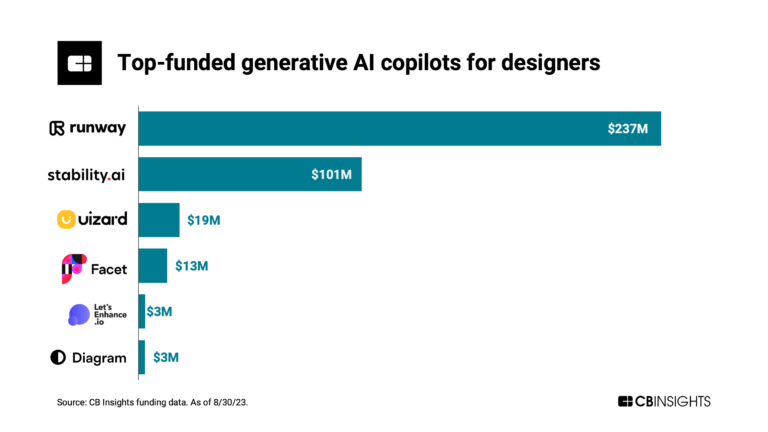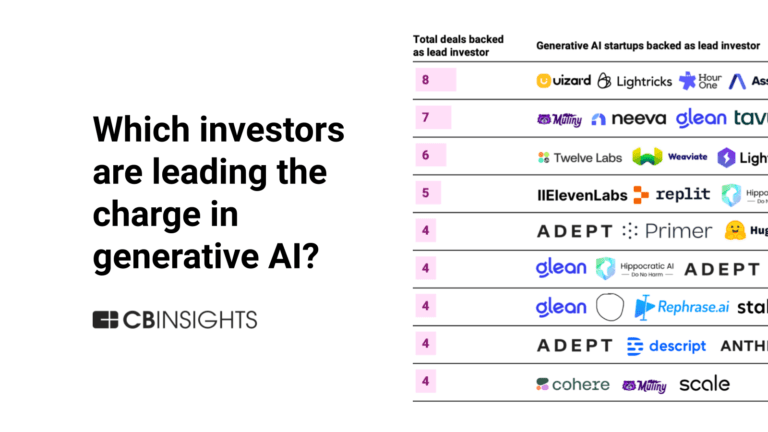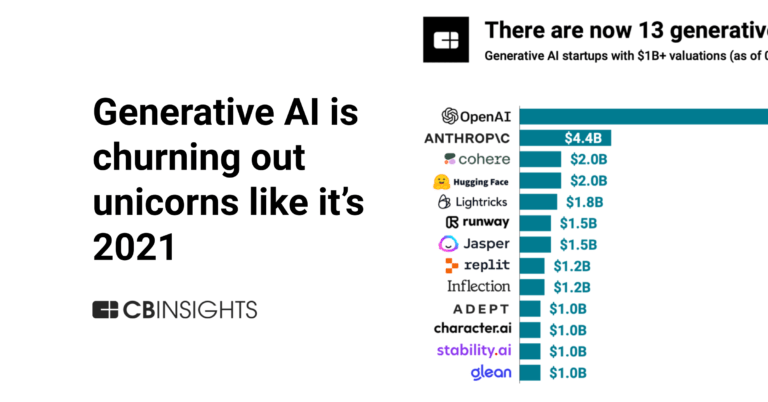
Stability AI
Founded Year
2019Stage
Corporate Minority | AliveTotal Raised
$231MRevenue
$0000Mosaic Score The Mosaic Score is an algorithm that measures the overall financial health and market potential of private companies.
+11 points in the past 30 days
About Stability AI
Stability AI focuses on developing generative artificial intelligence across various domains, including imagery, video, audio, and language. The company offers a suite of AI models that enable the creation of photorealistic images, videos, audio, and 3D objects, as well as language processing capabilities. Stability AI provides flexible licensing options for the commercial use of their AI models and platforms. It was founded in 2019 and is based in London, United Kingdom.
Loading...
ESPs containing Stability AI
The ESP matrix leverages data and analyst insight to identify and rank leading companies in a given technology landscape.
The generative AI — photo & video tools market provides software that uses machine learning algorithms to automate and enhance image and video creation and editing. Companies in this market offer solutions that automatically generate visual content, enhance image quality, restore details, remove backgrounds, correct colors, and process media significantly faster than traditional methods. These too…
Stability AI named as Leader among 15 other companies, including Canva, Synthesia, and Runway.
Stability AI's Products & Differentiators
Stable Diffusion 3.5
Stable Diffusion 3.5 is Stability AI's most powerful image model yet. This open release includes multiple variants that are customizable, run on consumer hardware, and are available for use under the permissive Stability AI Community License.
Loading...
Research containing Stability AI
Get data-driven expert analysis from the CB Insights Intelligence Unit.
CB Insights Intelligence Analysts have mentioned Stability AI in 9 CB Insights research briefs, most recently on Jan 3, 2024.
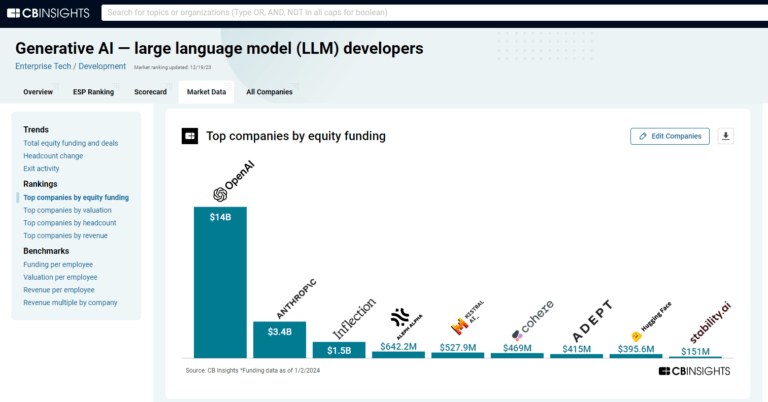
Jan 3, 2024
2024 prediction: Anthropic acquires Stability AI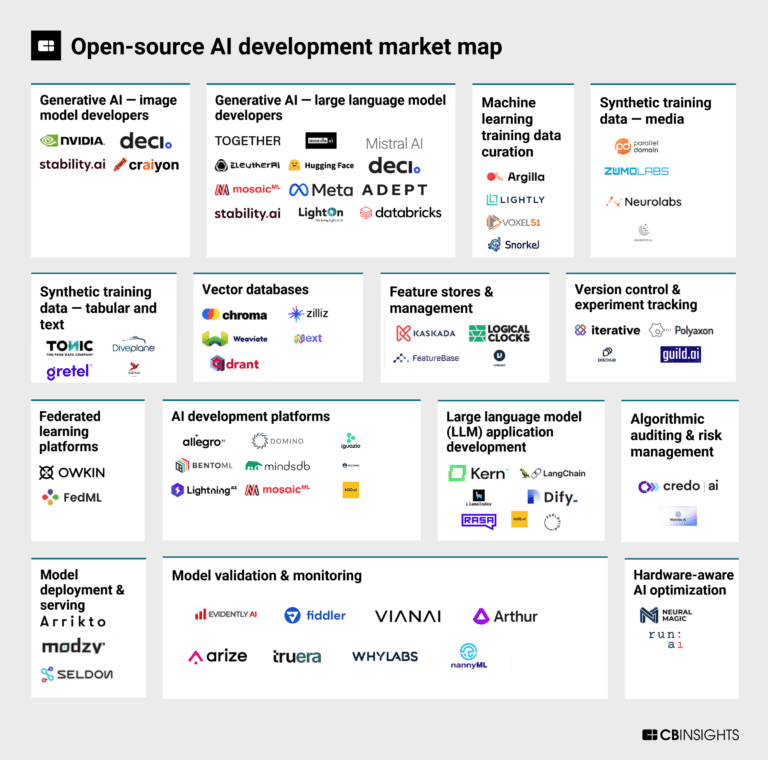
Oct 13, 2023
The open-source AI development market map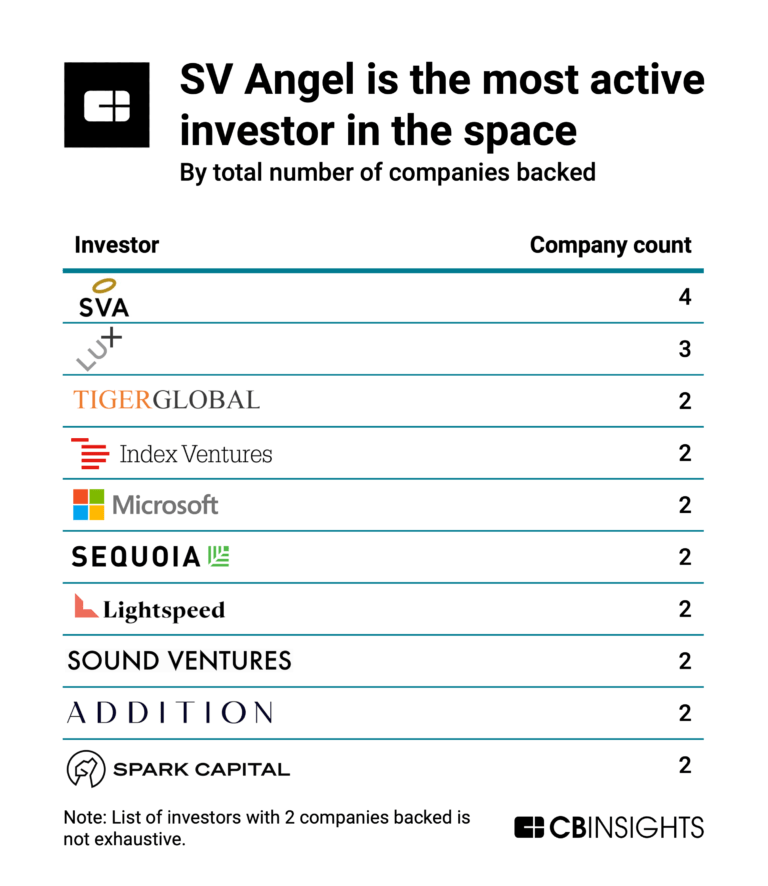
Jul 14, 2023
The state of LLM developers in 6 chartsExpert Collections containing Stability AI
Expert Collections are analyst-curated lists that highlight the companies you need to know in the most important technology spaces.
Stability AI is included in 4 Expert Collections, including Unicorns- Billion Dollar Startups.
Unicorns- Billion Dollar Startups
1,276 items
Artificial Intelligence
12,322 items
Companies developing artificial intelligence solutions, including cross-industry applications, industry-specific products, and AI infrastructure solutions.
Digital Content & Synthetic Media
2,287 items
The Synthetic Media collection includes companies that use artificial intelligence to generate, edit, or enable digital content under all forms, including images, videos, audio, and text, among others.
Generative AI
2,314 items
Companies working on generative AI applications and infrastructure.
Stability AI Patents
Stability AI has filed 1 patent.

Application Date | Grant Date | Title | Related Topics | Status |
|---|---|---|---|---|
9/11/2024 | 4/8/2025 | Grant |
Application Date | 9/11/2024 |
|---|---|
Grant Date | 4/8/2025 |
Title | |
Related Topics | |
Status | Grant |
Latest Stability AI News
Jul 2, 2025
Victoria MacLeod Three American giants are actively protecting their intellectual property rights against generative AI, as two legal battles commence on both sides of the Atlantic. In the UK, Seattle-based media company Getty Images accuses UK-based Stability AI of multiple IP infringements. In the US, The Walt Disney Company and Universal Studios are teaming up against Midjourney, an AI startup, with their main ground being copyright infringement. Both cases are centered around questions legal minds have been posing since the introduction of generative AI: Is the output of generative AI an infringement? And who is ultimately responsible for the output, the platform or the user? Getty Images v. Stability AI Getty initially filed a claim in the High Court in 2023, which resulted in Stability applying for reverse summary judgment on the grounds that Getty had no real prospect of success, arguing that their operations took place outside the UK. However, the High Court judge hearing the case decided that the claims brought by Getty did have a real prospect of succeeding in court. Despite this, Stability saw a small victory when the court ruled that the representative action brought by Getty would not succeed due to the difficulties in identifying who qualified for the class. The proposed class was comprised of 50,000 rightsholders who alleged their rights were also infringed. Stability was successful in arguing that identifying these individuals would be challenging due to the unclear definition of the class. This current trial is centered around four main grounds: Copyright infringement. Getty accuses Stability of using content that Getty owns or has an exclusive license for when training their model, Stable Diffusion, resulting in the generated output containing substantial parts of that content. Getty is also alleging secondary copyright infringement, arguing that Stability is importing an article into the UK that they know is infringing Getty's content (i.e., Stable Diffusion). During the trial's closing speeches, Getty dropped its copyright infringement claim to focus only on the remaining claims—likely due to challenges producing sufficient evidence to satisfy the threshold under UK law. For its part, Stability argues that the training took place outside of the UK and there were no reproductions made of Getty's copyright within the UK. As such, they argue, there is no secondary copyright infringement, and any output that features Getty's images was purposefully created by Getty and generated by using prompts in a way that does not reflect how the average user would use the technology. Trademark Getty accuses Stability of using Getty's watermarks to train its AI models and that these watermarks are included in the final output. Stability argues that any output showing Getty's watermarks was created by Getty's own legal team and was not as a result of using Stability in the ordinary course of trade. They also argue that any watermarks seen on outputs were not used by Stability and do not result in confusion or unfair advantage. Database rights infringement. Getty argues that Stability has infringed their rights by using a large part of their database and reusing it for their own purposes. This argument is based on their claim that their large content collection should be deemed a database under the Copyright and Rights in Database Regulations 1997. Stability argues that Getty's collection does not meet the requirements to be classified as a database and should not be afforded the associated protection. Additionally, the alleged extraction did not occur within the UK, and they have not reused the content, as there is no correlation between the output and Getty's content. Passing off. Getty argues that outputs use content from Getty's Getty Images and iStock, resulting in the misrepresentation that the output is owned or licensed by Getty. Stability argues that (1) any such misrepresentation claimed would be made by the user and not by Stability, and (2) any similarity in the output is not enough to confuse or deceive the general public. The trial in the UK began on June 9, 2025, and is due to end on June 30, 2025. The judgment is expected sometime in July. Disney and Universal v. Midjourney Before suing the generative AI company Midjourney, which specializes in text-to-image generation, both Disney and Universal sent separate cease-and-desist letters that reportedly went unanswered. Following this, the two media companies jointly filed a case in the US District Court of Los Angeles. The primary arguments being put forward by Disney and Universal are also copyright infringement and secondary copyright infringement, echoing those being made by Getty in its case against Stability. It is too early to know what Midjourney will argue in their defense, but similar arguments to Stability AI are expected—that the users are the ones responsible for the outputs. What Does This All Mean? Although these cases are taking place in two different jurisdictions, the impact of their judgments is likely to be felt globally. With generative AI still in its infancy, many jurisdictions are still not well equipped to deal with the legal ramifications of content being created by this ever-evolving technology. As a result, many legal systems are looking at others before determining their next steps. The long-employed defense of fair use will be put to the test yet again, and the lines may be drawn more clearly with a potential decline in generative AI companies being able to rely on it. This defense has already been rejected in one US court in the recent decision from the Thomson Reuters v. Ross Intelligence case. However, the more recent decision in Bartz v. Anthropic resulted in a federal judge allowing the defense of fair use and ruling that training the AI model on books without the author's consent is not infringement. It is worth noting that in that case, the books were obtained from pirate websites, and so there will be another trial to determine the legality of the library Anthropic used. Although the courts seem to be split over whether fair use should be allowed in relation to generative AI, the decisions do suggest that the source material should be legally obtained prior to training the models. Therefore, AI companies may need to start looking for other solutions to prevent future claims of infringement, such as licensing content for AI model training. This move would be welcomed by rightsholders but would result in additional costs for the AI startups. Governments are likely to feel more pressure to put in place AI laws that bring more clarity than current laws and regulations on AI—especially in the UK, now that Getty has dropped their copyright infringement case and there will be no imminent judgment on this issue from the High Court. With the fast-paced nature of generative AI, it is likely governments will find themselves in an increasingly difficult position, with some wanting to keep a more laissez-faire approach and others wanting more stringent protections for their intellectual property. In the absence of court decisions to bridge the gap, many common-law jurisdictions will now be looking for legislative changes instead. The decisions coming from the UK and US courts may be highly persuasive around the world and could lead to legislative changes to bring some stability for rightsholders and users. After all, IP laws tend toward global alignment, and it is unlikely rightsholders or governments will want to go against the stream in such uncertain times. The content of this article is intended to provide a general guide to the subject matter. Specialist advice should be sought about your specific circumstances.
Stability AI Frequently Asked Questions (FAQ)
When was Stability AI founded?
Stability AI was founded in 2019.
Where is Stability AI's headquarters?
Stability AI's headquarters is located at 88 Notting Hill Gate, London.
What is Stability AI's latest funding round?
Stability AI's latest funding round is Corporate Minority.
How much did Stability AI raise?
Stability AI raised a total of $231M.
Who are the investors of Stability AI?
Investors of Stability AI include WPP, Lightspeed Venture Partners, Sound Ventures, O'Shaughnessy Ventures, Coatue and 12 more.
Who are Stability AI's competitors?
Competitors of Stability AI include Bria, Sakana AI, Moondream AI, Beyond Presence, Ideogram and 7 more.
What products does Stability AI offer?
Stability AI's products include Stable Diffusion 3.5.
Loading...
Compare Stability AI to Competitors

Ideogram utilizes artificial intelligence in graphic design within the technology sector. Its main offering allows users to transform their ideas into designs, which may require some design skills. It was founded in 2022 and is based in Toronto, Canada.

Midjourney is an independent research lab that focuses on the exploration of new mediums of thought and the expansion of human imaginative capabilities. The lab conducts exploratory research aimed at enhancing the cognitive and creative processes of individuals. It was founded in 2021 and is based in San Francisco, California.

Sakana AI focuses on developing artificial intelligence (AI) through nature-inspired foundation models within the research and development sector. Its main offering includes creating a new kind of foundation model that draws inspiration from natural intelligence, designed to advance the field of AI. It was founded in 2023 and is based in Tokyo, Japan.

Runway focuses on advancing the fields of art, entertainment, and human creativity through artificial intelligence. The company offers tools that enable the creation of visual and multimedia content, leveraging artificial intelligence (AI) to provide users with control over stylistic elements in their projects. Runway primarily serves the creative industries, providing solutions for filmmakers, artists, and storytellers. It was founded in 2018 and is based in Dover, Delaware.

Beyond Presence creates digital clones for virtual communication within the technology sector. The company offers a service that allows users to create digital avatars that participate in video calls and engage in conversations. Its avatars can be customized with knowledge and language preferences, and the company provides analytics on conversations held by these digital agents. It was founded in 2024 and is based in München, Germany.
LG AI Research conducts research in artificial intelligence within the technology sector. The company works on machine learning and the development of AI solutions that include language, vision, and multimodal processing, along with data and materials intelligence. It was founded in 2020 and is based in Seoul, South Korea.
Loading...


